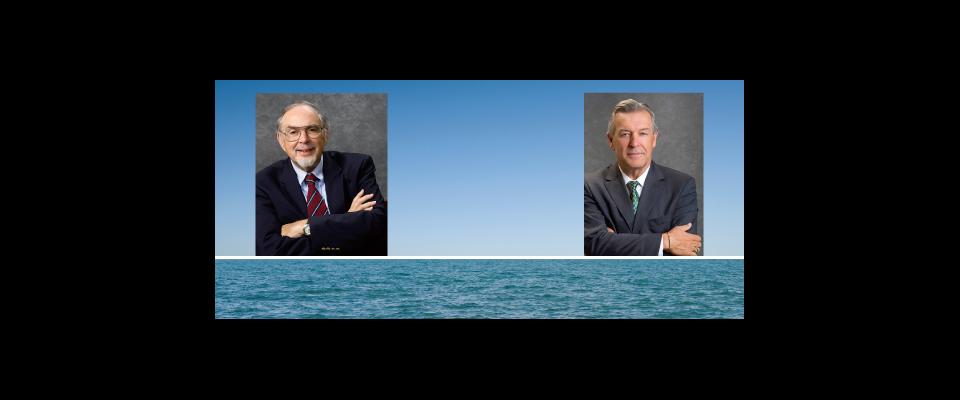Professors Caron and Scheiber pilot the Law of the Sea Institute through the shoals of international legal issues.
Covering more than two-thirds of Earth’s surface, the oceans have always been a vast no-man’s-land—despite our quixotic efforts to claim and control them. Even mighty Julius Caesar once found himself kidnapped by Cilician pirates. Told they intended to ransom him for 20 gold talents, a miffed Caesar insisted he was worth at least 50. After the pirates demanded that marked-up ransom, pocketed it, and released their captive, Caesar exacted payback: He raised a fleet, apprehended the captors, and crucified them.
For the next two millennia, humans struggled to establish a law of the seas. Aspiring colonial empires attempted to simply claim ocean waters as national property, until a Dutch jurist named Hugo Grotius prevailed with his 1604 pamphlet Mare Liberum, promulgating the notion that the high seas were international territory open to free use by all. Countries held ownership three miles off their coastline, because that was the firing range of their canons.
But Grotius never envisioned motorized fishing fleets, offshore oil derricks, or U.S. President Harry Truman citing “freedom of the seas” to justify nuclear bomb tests over the Pacific.
The 21st century’s challenges are more vexing. Piracy has rebounded at an alarming rate, particularly off East Africa. Global warming is redefining established coastal territory, especially in the melting, oil-rich Arctic. A concentrated world population—more than half of our nearly 7 billion people live on or near the coast—is wreaking havoc on the ocean. Most human-generated carbon emissions settle into the ocean, elevating acidity enough to literally change the skeletal structures of sea creatures. Nuclear wastes are accumulating there, as well.
Given our dependence on oceans, which provide the oxygen in every other breath we take, it’s critical that we figure out how to govern their use now and in the future. That will take an international response based on the best scholarship in the business. Which brings us to an obscure corner of Boalt Hall at Berkeley, housing a consortium known as the Law of the Sea Institute.
The institute, which hosts workshops and conferences and publishes papers and books on ocean issues, is directed by Berkeley’s own odd couple, Harry and David: legal history professor Harry Scheiber and international law professor David Caron. Scheiber, a self-described “ivory tower academic,” can expound in meticulous detail on constitutional federalism and international fisheries management. Caron, a graduate of the U.S. Coast Guard Academy, a former salvage diver, and once a legal assistant to the Iran-United States Claims Tribunal in The Hague, is more worldly.
Most people on campus aren’t even aware of the institute’s existence. It bounced from Rhode Island to Hawaii to Florida before transferring to Berkeley in 2002. It builds on the work of the renowned late Berkeley law professor Stefan Riesenfeld and was embraced by Boalt’s John Dwyer, the only law school dean in history to hold a Ph.D. in chemical physics from Caltech.
“We’ll get international scholars visiting us who look for this big institute building, and we have to tell them, well, we have this little four-by-six office. You know, the Institute for Legal Research, which I direct, has three distinctive programs. I say we have to have a little sign on the door that we can flip over, depending on who’s coming to visit,” joked Scheiber.
Caron and Scheiber have jointly taught a class in ocean law while wallpapering their passports with stamps. Both organize and attend conferences as prestigious as the one at the United Nations–linked International Tribunal of the Law of the Sea in Hamburg, Germany, which covered issues ranging from piracy in the Indian Ocean to exploitation of the seabed. The two scholars also participate in congressional briefings and consult with federal agencies.
“The institute is highly regarded among ocean and maritime law scholars,” noted Commander Russ Bowman of the Coast Guard Academy, “both for the quality of its continuing scholarship and the caliber of events it hosts nationally and abroad.”
We’re trying to identify cutting-edge issues of international law and bring together scholars from around the world to address them,” Scheiber said. “People used to think that the ocean was a sink that could absorb whatever we put into it, indefinitely. Now we know better.”
Indeed, today’s seas are in critical condition; Code Blue. Environmentalists insist the ocean can no longer be treated as a sink, a supermarket, or a sewer. Fishing specialists describe the sea as a “fish bank account” and warn that we are drawing dangerously down on its principal via illegal, unregulated, and unreported fishing. Navies combat pirates who imperil the seas with speedboats and automatic rifles. Pirates sell shares of future plunder to investors and have seized so much booty they’re now “discounting” ransoms on ships to make room for new inventory.
To complicate matters, two-thirds of the ocean is high seas, which lie outside the control of individual countries and are virtually unprotected. This poses a tangled kelp bed of problems. “Although the oceans are the norm on our planet—land is the exception—it’s still easy to forget about the oceans. Our role is to keep calling attention to them, and how international law can be used to protect them and those who use them,” said Caron.
Four decades ago, the international community acknowledged it needed a “law of the seas” agreement. The world had witnessed an explosion of countries claiming jurisdiction or outright sovereignty over waters 200 miles off their coasts. The United States, whose unilateral action had inadvertently set off the craze, led a U.N. effort to resolve conflicting claims.
Years of effort resulted in what’s been called the “Constitution of the Oceans”—the 1982 U.N. Convention on the Law of the Sea. The treaty extended territorial seas up to 12 miles from the coasts. A new “in-between” ocean zone up to 200 miles from shore was created to serve as an “exclusive economic zone” where adjacent countries may extract minerals, oil, and fish, while it remains open to foreign ships. The treaty also founded the Hamburg-based tribunal: Parties agree to abide by its decisions, although it has no enforcement authority.
Former U.N. Secretary-General Boutros Boutros-Ghali hailed the treaty, noting that “the dream of a comprehensive law of the oceans is an old one. Turning this dream into reality has been one of the greatest achievements of this century.”
Ironically, the United States has never joined the 162 countries that have since ratified the U.N. treaty. The Reagan administration first balked over provisions regarding deep seabed mining, such as requiring U.S. industry to “share” technology with other countries. Such concerns were addressed, and President Bill Clinton signed the treaty. Still, the U.S. Senate has failed to ratify: A handful of conservatives insist it infringes on national sovereignty.
“The persistence with which nation-states cling jealously to their traditional prerogatives of sovereignty” is an age-old problem, says Scheiber. He calls U.S. inaction “especially grievous.” To their chagrin, Scheiber and Caron are forced to explain it wherever they go. “It’s not the embarrassment of being asked to answer all these questions about ratification—it’s the fact that you have to take the time,” said Caron. “We should be working on a new problem.”
But the treaty was an entrée for Berkeley. One day in 1981, Caron (then a first-year law student) made a suggestion to Professor Riesenfeld. That itself required gumption; Riesenfeld was known to be rather crotchety, a man who dismissed students with ripostes such as “You have mashed potatoes for brains.”
“He was Germanic in the sense of a gruff, tough teacher,” Caron explained, “but warm, very warm, once you got to know him.”
“Unless he thought you were stupid,” interjected Scheiber. “A big caveat.”
Upon meeting Riesenfeld, Caron proposed “a very large law of the sea conference here at the school in Berkeley because the big U.N. conference is coming to an end. We should have everyone come here and discuss what’s happening. And he looks up at me and says, ‘That is the stupidest idea I’ve ever heard! Why do you think everyone would want to come here?'”
But Caron persevered, and the first Berkeley conference on the law of the sea happened in February of 1982. In an about-face, Riesenfeld not only became one of its greatest proponents, he asked Caron to become his research assistant. The conference further established Berkeley as a core international player in the field and led to the institute’s being Boalt based today.
As co-directors, Caron and Scheiber share camaraderie despite starkly different backgrounds. Caron retains the athleticism of his Coast Guard years and has a zest for escapist adventure. When he was in sixth grade, his father suffered a stroke; David, who cared for him for several years, took refuge in National Geographic and dreamed of becoming a scuba diver and trekking the globe.
“In 1970 I had lost my father, and my mother knew nothing about college,” Caron recalled. “I had all kinds of scholarships but my mother had no money—where was $200 going to come from? The Coast Guard Academy seemed like a good option.” He threw himself into everything at the academy, learning to scuba dive and graduating at the top of his class and with a year’s worth of extra credits. He was given his first-choice ship assignment, a new icebreaker out of Seattle. Destined for the Arctic, it offered the greatest quotient of distant adventure.
Soon after reporting for duty, he volunteered to go to salvage-diving school—submitting to grueling training, including daily double swims in winter across the freezing Anacostia River. “Someone had told me there will come a moment when you have to go for it, and you must not hesitate…. So I just stepped forward and said I’ll go,” Caron recalled.
His stint as a salvage diver included daring missions such as rescuing the remains of a storm-crashed helicopter off the coast of British Columbia. But Caron eventually returned to academics, became a Fulbright Scholar, and studied ocean law and policy in Britain before earning his law degree from Boalt in 1983. After a four-year turn as a corporate attorney, he joined the Boalt faculty. Caron is also now president of the American Society of International Law.
Scheiber, the senior of the two, looks as if he would be at peace poring over documents in a gargantuan library. He grew up in New York, where his most intimate encounter with water was “on a team rowing on the beautiful Harlem River for four years.” Fascinated by history, he majored in the subject at Columbia College and drew a doctorate in American history at Cornell. While attaining a full professorship at Dartmouth, he headed the New Hampshire chapter of the American Civil Liberties Union, which defended conscientious objectors and antiwar protesters.
Scheiber bored into the Ohio Canal era and the federal regulation of banks in the 1830s, and he became an authority on federalism. “Gradually I was morphing from being an economic historian to being a legal historian, without the J.D.,” he noted. “My son says it’s the best kind of law to pursue because there’s no law school tuition and no bar exam.”
One other factor would chart Scheiber’s career: He accepted an American history professorship at UC San Diego, where his wife was editor for a marine geologist at the Scripps Institution of Oceanography. “She had a beautiful office overlooking the Pacific,” he recalled. “Scripps had just begun an archive on the history of the oceans … so I started working with the archivist and became personally involved.” The more he learned, the keener his interest in ocean law—he could see a Russian fishing fleet just three miles off the San Diego coast.
In 1980, Scheiber was lured to Berkeley by Boalt’s unique program offering a Ph.D. through its Jurisprudence and Social Policy program.
Soon he committed to writing in the field of ocean policy—a topic that Riesenfeld had already sanctified at Berkeley. “I could understand textbook oceanography from the 1940s very well,” said Scheiber. “My first interest was to crack a question that had never been addressed: How did scientific advances in oceanography get incorporated into international law?” He published on the origins of ecosystems research—how people counted the number of fish caught and determined its toll on the stock. He also specialized in the savvy U.S. decision to help rebuild Japanese fishing and whaling interests after World War II.
Today, “fisheries management” has been characterized as an endless argument about the number of fish in the sea, to be resolved only when all doubt has vanished—along with all the fish. Scheiber’s historical perspective fuels his urgent message that many fish stocks worldwide are in crisis. Example: He asserts that Japan’s record of “willful subversion” of multilateral agreements by underreporting its tuna catch is “wreaking possibly irreversible damage to the bluefin stocks in the Southwest Pacific.” He contends that the U.N. treaty hasn’t been effective enough in an era in which boats can use helicopter surveillance and sonar technology to pinpoint prime catches.
Another issue for which the Law of the Sea Institute provides a forum for international study and debate is the perpetual dispute over who owns what. Riots have erupted due to a Korea-versus-Japan dispute over an obscure group of islets called either Dokdo or Takeshima—located in a sea known, depending on your orientation, as either the East Sea or the Sea of Japan. Japan wants the islets for fishing. South and North Korea, in rare unity, regard them as symbolic of Korean resistance to Japanese aggression and imperialism.
And the long inhospitable Arctic is another looming tug-of-war: As global warming promises to seasonally open formerly frozen waters, countries ringing the Arctic (particularly the one with the largest coastline, Russia) will expand claims to the adjacent oil, fishing rights, and new shipping routes. Five years ago, Russian explorers floated minisubs into the Arctic and planted a rustproof flag on the seabed 14,000 feet below the North Pole—a stunt similar to the U.S. installation of an American flag on the moon. Russia’s move drew a rebuke from Canadian foreign minister Peter MacKay: “This isn’t the 15th century. You can’t go around the world and just plant flags and say ‘We’re claiming this territory.'” Both countries have taken their cases to the United Nations, seeking a technical ruling on whether the submerged Lomonosov Ridge is an extension of Russia’s continental shelf or Canada’s.
The Law of the Sea Institute has co-sponsored conferences that explored both disputes, and more. Caron took the lead in organizing a conference and book of papers on nuclear weaponry and waste in the oceans—a topic that epitomizes the fragmentation of information. “It is understudied, amazingly understudied,” Caron said. Perhaps the most chilling result is that nobody has any way of knowing the number of lost nuclear subs or buried fuel rods leaking contaminants into the oceans.
Last but not least: piracy. In 2010, at least 4,185 seafarers were attacked by pirates using firearms and even rocket-propelled grenades, and more than a thousand of those were taken hostage, according to a report cited by the U.N.’s International Maritime Organization. Last year, Somali pirates alone held 470 hostages and killed 15, according to the private IMB Piracy Reporting Centre. Piracy now costs the global shipping industry billions of dollars every year, and experts say the number of pirates could double by 2016—after all, a Somali pirate earns almost 150 times his country’s average wage.
Although the 1982 U.N. treaty outlaws piracy on the high seas, and a more recent U.N. resolution authorizes the pursuit of pirates who seek refuge in territorial waters, pirates continue to thrive. There are, however, fresh signs that expanding policing by international navies may be starting to have a positive effect. “It reflects that much of the problem in the ocean is institutional—that they are too big to enforce,” Caron said.
Even when they catch pirates, today’s world leaders seem befuddled by what to do with them. Somalia lacks a functioning state to bring pirates to justice. Kenya briefly volunteered for the job, but soon found its courts buckling under the strain. British and Danish officials fretted that attacks on pirates risked violating their human rights—prompting one Danish crew to simply strip apprehended pirates of their guns and drop the pirates on a deserted shore. Others have seconded the Russians’ call for formation of an international court solely to try pirates.
In the first piracy cases on U.S. soil since the 1800s, two Virginia judges reached opposite rulings in 2010 on whether apprehended Somalis could be charged with piracy here. One judge contended that because the act was interrupted before anyone was robbed, no actual piracy had occurred—a ruling U.S. prosecutors have appealed. The other Virginia case, and subsequent cases, have resulted in some convictions of Somalis for piracy. Meanwhile the U.S. response has gotten more aggressive, increasingly deploying the Navy Seals to rescue hostages and either take pirates into custody or take them out altogether.
Thus far, nobody is suggesting a return to crucifixion.
“When you survey the evolution of the law of the sea, you realize how far we’ve come,” Scheiber said. But the work of the Law of the Sea Institute is a reminder of the challenges yet ahead to preserve the oceans and all of us whose lives depend upon them.




















